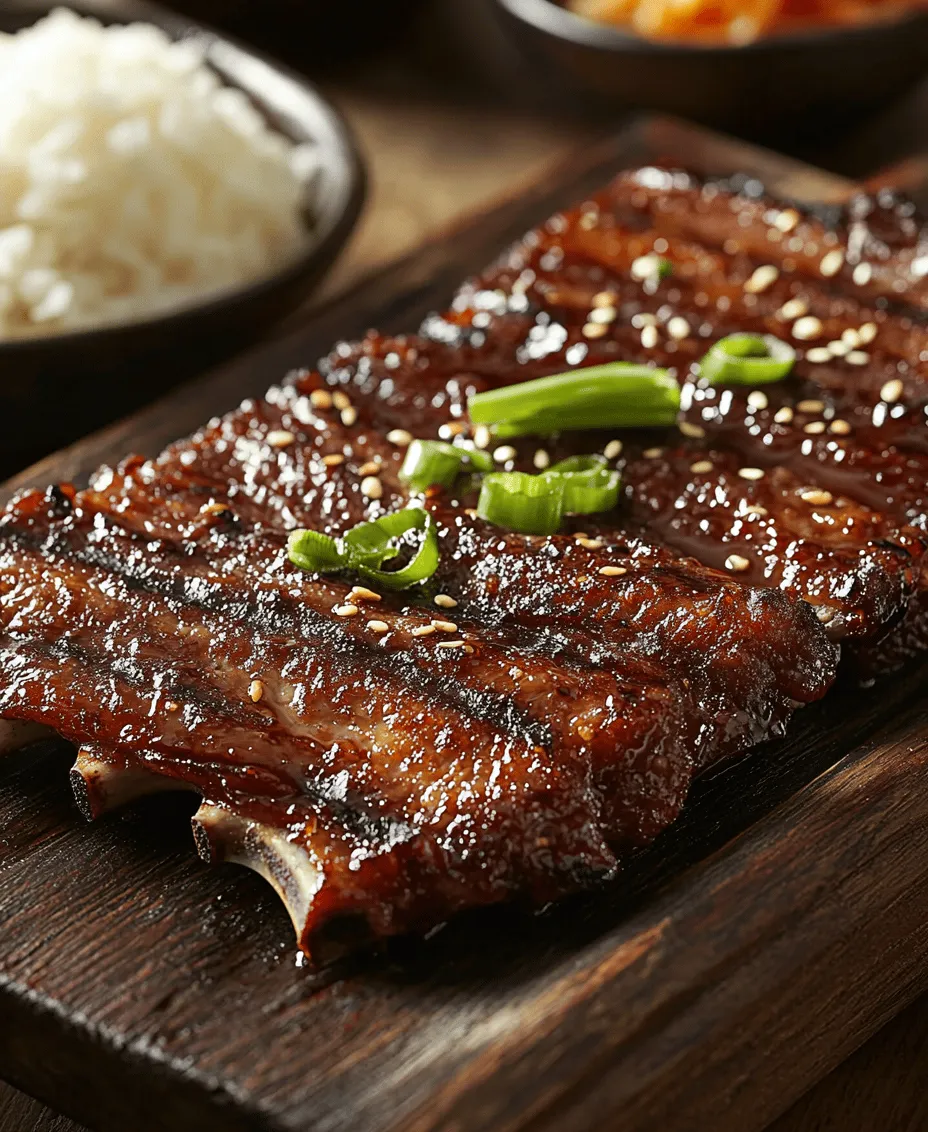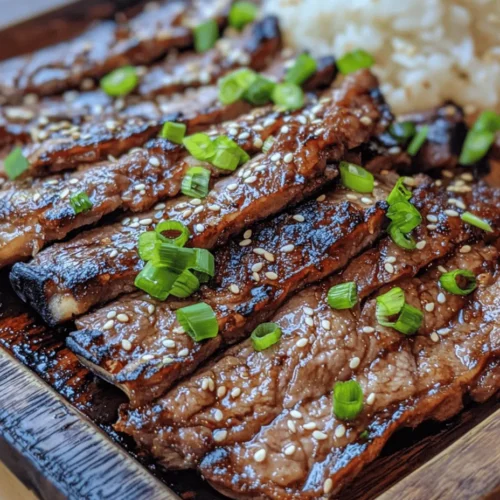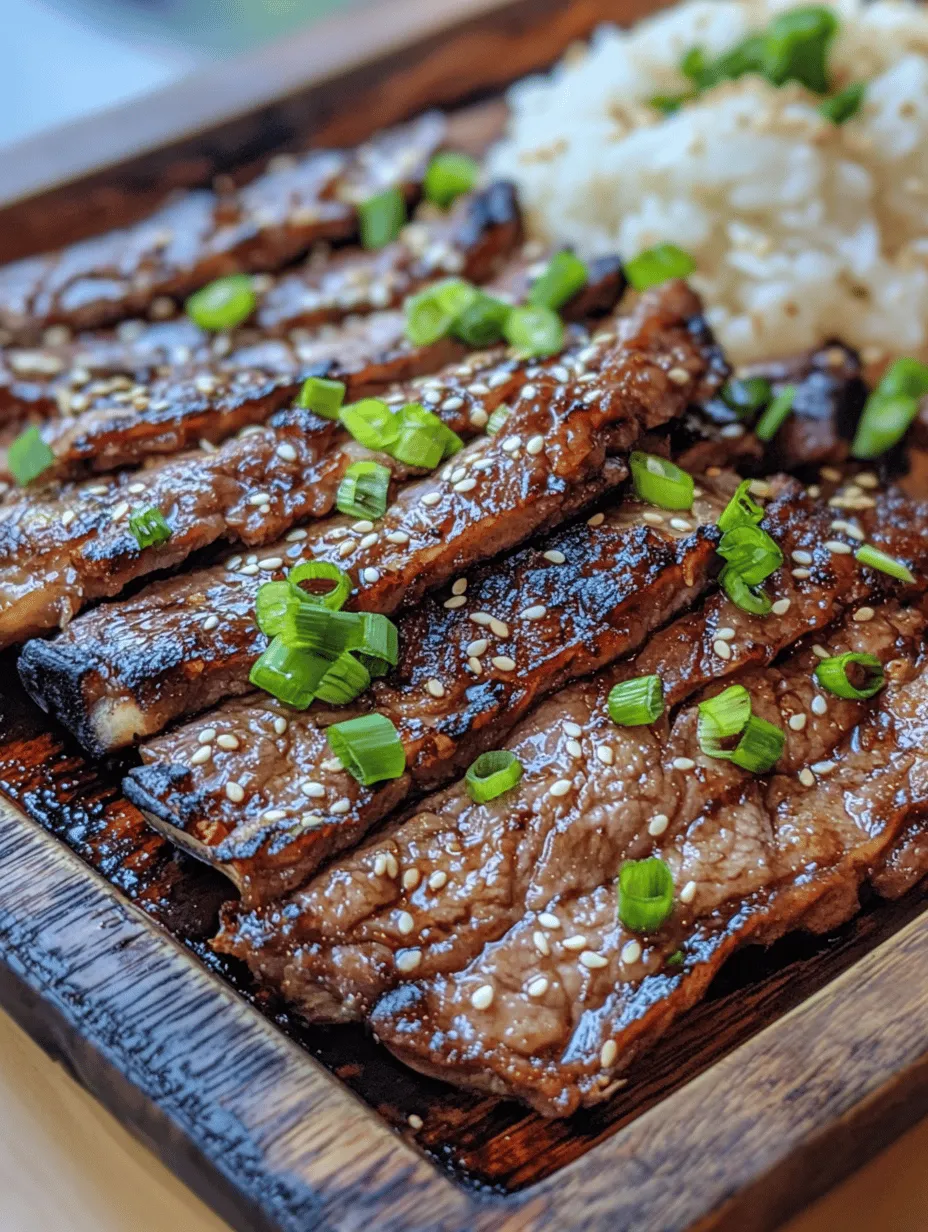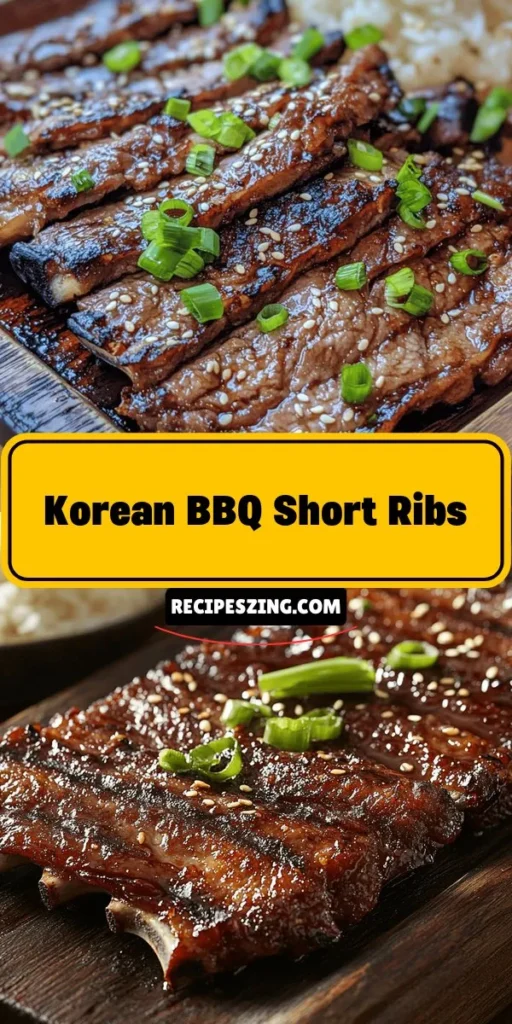Introduction
Korean barbecue has become a global sensation, captivating food enthusiasts with its vibrant flavors, communal dining experience, and rich cultural heritage. This cooking style is not just about grilling meat; it is a celebration of flavors, textures, and aromas that engage all the senses. Central to this tradition is the practice of marinating meat, which enhances the taste and tenderness, making every bite a delightful experience.
Among the many dishes that define Korean barbecue, Sizzling Korean BBQ Short Ribs stand out as a must-try. These tender, juicy ribs are infused with a savory-sweet marinade that balances umami flavors with a hint of spice, creating an irresistible dish that is perfect for gatherings or a cozy family dinner. With the right preparation, these short ribs can be transformed into a mouthwatering feast that showcases the essence of Korean cuisine.
Understanding Korean BBQ
History of Korean BBQ and Its Evolution
The origins of Korean barbecue can be traced back to the 1950s, post-Korean War, when the country began to embrace Western influences while preserving its culinary heritage. Traditionally, Korean BBQ involves grilling marinated meat over an open flame, often at a table where diners can cook their food to their liking. This communal aspect of dining fosters a sense of togetherness and enjoyment.
Over the years, Korean BBQ has evolved, incorporating various cuts of meat, marinating techniques, and side dishes. Today, it is appreciated not only in Korea but also around the world, with Korean BBQ restaurants popping up in cities globally, offering an authentic taste of this beloved cuisine.
Importance of Marinating in Korean Cuisine
Marinating is a cornerstone of Korean cooking, serving multiple purposes. It tenderizes the meat, enhances its flavor, and adds moisture, ensuring that each bite is succulent. The marinade often includes a mix of soy sauce, sugar, garlic, and other seasonings, creating a complex flavor profile that is characteristic of Korean BBQ.
The marinating process allows the meat to absorb the robust flavors, making it more enjoyable. The longer the meat marinates, the deeper the flavors infuse, which is why preparation is key to achieving an exceptional dish.
Overview of Key Ingredients Used in Korean BBQ
Korean BBQ relies on a variety of ingredients that contribute to its unique taste. Some of the staples include:
– Soy Sauce: A fundamental ingredient that provides depth and umami.
– Brown Sugar: Essential for caramelization and adding sweetness.
– Sesame Oil: Known for its aromatic properties, it enhances flavor and adds richness.
– Rice Vinegar: Introduces acidity that balances the sweetness.
– Garlic and Ginger: These aromatics elevate the dish with their bold flavors.
– Gochujang: A fermented chili paste that brings heat and complexity.
– Sesame Seeds and Green Onions: These are often used as garnishes that add texture and vibrant color.
Each ingredient plays a critical role in crafting the perfect Sizzling Korean BBQ Short Ribs, and using fresh, high-quality components is essential for achieving optimal flavor.
Ingredients Breakdown
To prepare Sizzling Korean BBQ Short Ribs, you will need the following ingredients, each contributing to the dish’s rich flavor profile.
Beef Short Ribs: Types and Selection Tips
When it comes to short ribs, there are two primary cuts to consider: flanken-style and English-style. Flanken-style short ribs are cut across the bone, resulting in thinner strips that are perfect for grilling. English-style short ribs are thicker and cut parallel to the bone, providing a meatier bite. For this recipe, flanken-style ribs are recommended as they absorb marinades well and cook quickly, making them ideal for a sizzling BBQ experience.
When selecting short ribs, look for well-marbled meat, as the fat content enhances flavor and tenderness during cooking. Freshness is key; choose ribs that are bright red with minimal discoloration.
Soy Sauce: Types and Flavor Profile
Soy sauce is a cornerstone of Korean cuisine, and it comes in various types. The most common types include light soy sauce, dark soy sauce, and tamari. For this recipe, a good-quality light soy sauce is preferred, as it has a milder flavor that won’t overpower the marinade. It adds saltiness and depth, essential for enhancing the taste of the short ribs.
Brown Sugar: Role in Caramelization
Brown sugar is an integral part of the marinade, contributing sweetness and helping to create a beautiful caramelized crust when grilled. The molasses content in brown sugar not only enhances the flavor but also aids in moisture retention, ensuring that the short ribs remain juicy throughout the cooking process.
Sesame Oil: Its Aromatic Properties and Health Benefits
Sesame oil is known for its distinctive nutty aroma and flavor. It adds richness to the marinade and imparts a unique taste that complements the other ingredients beautifully. Beyond its flavor profile, sesame oil is also packed with health benefits, including antioxidants and healthy fats, making it a valuable addition to any dish.
Rice Vinegar: Adding Acidity and Depth
Rice vinegar is another key component of the marinade, providing a gentle acidity that balances the sweetness of the brown sugar. This balance of flavors is crucial in Korean cuisine, as it enhances the overall taste experience. Rice vinegar also helps in tenderizing the meat, making it an essential ingredient in achieving perfectly marinated short ribs.
Garlic and Ginger: Their Roles in Flavor Enhancement
Garlic and ginger are staples in Korean cooking, known for their bold flavors and aromatic qualities. They not only enhance the taste of the marinade but also contribute health benefits, including anti-inflammatory properties and improved digestion. Freshly minced garlic and ginger should be used to maximize their flavor impact, creating a robust base for the marinade.
Gochujang: Understanding This Essential Korean Condiment
Gochujang is a fermented chili paste that is synonymous with Korean cuisine. It is made from red chili powder, glutinous rice, fermented soybeans, and salt, resulting in a thick paste with a complex flavor profile that includes sweetness, spice, and umami. For Sizzling Korean BBQ Short Ribs, gochujang adds a subtle heat and depth, elevating the dish to new heights. Adjust the amount based on your heat preference, as it can range from mild to spicy.
Sesame Seeds and Green Onions: Finishing Touches That Elevate the Dish
To bring the dish together, toasted sesame seeds and sliced green onions are used as garnishes. Sesame seeds add a delightful crunch and a nutty flavor, while green onions provide freshness and color. These finishing touches not only elevate the dish visually but also add an extra layer of flavor that enhances the overall tasting experience.
Importance of Fresh Ingredients for Optimal Flavor
Using fresh, high-quality ingredients is crucial in any recipe, especially in Korean BBQ. Fresh short ribs, vibrant vegetables, and quality condiments will significantly impact the final dish’s flavor. Whenever possible, choose organic produce and high-grade meats to ensure that your Sizzling Korean BBQ Short Ribs are not only delicious but also healthy.
Preparing the Marinade
Creating the perfect marinade for Sizzling Korean BBQ Short Ribs is a straightforward process that sets the stage for a flavorful dish. Follow these steps to prepare a marinade that will tantalize your taste buds:
1. Gather Your Ingredients: Collect all the marinade ingredients – soy sauce, brown sugar, sesame oil, rice vinegar, minced garlic, minced ginger, and gochujang.
2. Mix the Base Ingredients: In a mixing bowl, combine the soy sauce, brown sugar, sesame oil, and rice vinegar.
3. Whisk Until Smooth: Using a whisk, mix the ingredients thoroughly until the brown sugar is fully dissolved. This step is crucial, as it ensures that the marinade adheres to the meat evenly, allowing each rib to absorb the flavors effectively.
4. Add Aromatics: Incorporate the minced garlic and ginger, followed by the gochujang. Whisk again until all ingredients are well combined and the marinade is smooth.
5. Taste and Adjust: Sample the marinade and adjust seasoning if necessary. Depending on your preference, you might want to add a bit more soy sauce for saltiness or brown sugar for sweetness.
6. Marinate the Ribs: Once your marinade is ready, place the flanken-style short ribs in a large resealable plastic bag or a shallow dish. Pour the marinade over the ribs, ensuring they are well-coated. Seal the bag or cover the dish and refrigerate for at least 4 hours, preferably overnight. This extended marinating time allows the flavors to penetrate deeply, resulting in tender and flavorful ribs.
By following these steps, you’ll create a marinade that enhances the natural flavors of the short ribs while adding a delightful sweetness and depth that defines Korean BBQ.
With the marinade prepared and the ribs soaking in the delicious blend of flavors, you’re one step closer to a sizzling feast that pays homage to the rich traditions of Korean cuisine. Keep an eye out for the next part of this article, where we’ll delve into the cooking process, tips for grilling, and how to serve these amazing Sizzling Korean BBQ Short Ribs.

Tips for Adjusting the Marinade According to Personal Taste Preferences
Creating the perfect marinade for your Korean BBQ short ribs is not just about following a recipe but also about personalizing it to suit your taste. Here are some effective tips for adjusting the marinade according to your preferences:
1. Balance Sweetness: If you prefer a less sweet marinade, consider reducing the amount of sugar or honey. You can also substitute brown sugar with less sweet alternatives like coconut sugar or simply cut it down by half. Alternatively, add a splash of vinegar or citrus juice to counterbalance sweetness with acidity.
2. Increase Spice: For those who enjoy a bit of heat, adding gochujang (Korean red chili paste) or crushed red pepper flakes can elevate the spice level. Start with a small amount and taste as you go, adjusting according to your spice tolerance.
3. Umami Boost: Incorporate more umami flavors by adding a bit of miso paste or some extra soy sauce. These ingredients will enhance the overall depth of flavor in your marinade.
4. Fresh Herbs and Aromatics: Experiment with fresh herbs like cilantro or green onions, or add minced garlic and ginger for a fragrant kick. These ingredients can add a refreshing twist to the traditional marinade.
5. Acidity Adjustment: If you find that the marinade is too tangy, you can balance it by adding more sweet elements like honey or sugar. Conversely, if it lacks brightness, a bit more sesame oil or rice vinegar can wake it up.
Marinating the Short Ribs
Proper marination is crucial for achieving tender and flavorful Korean BBQ short ribs. Here are best practices and tips for marinating:
Best Practices for Marinating Beef
– Use Glass or Food-Safe Plastic: Always marinate your beef in glass or food-safe plastic containers. Avoid metal containers as they can react with the acidic ingredients in the marinade.
– Mix Thoroughly: Ensure that the marinade is well mixed before adding the short ribs. This ensures an even coating of flavors on the meat.
Timeframes: Minimum vs. Optimal Marinating Times
– Minimum Marinating Time: For a basic flavor infusion, marinate the short ribs for at least 30 minutes. This allows the surface of the meat to absorb some of the marinade.
– Optimal Marinating Time: For the best results, aim for 4 to 24 hours. The longer you marinate, the more flavor penetrates the meat, and the more tender the ribs become. However, avoid marinating for more than 48 hours, as this can lead to a mushy texture.
Storage Tips for Marinating Safely
– Refrigerate: Always marinate your short ribs in the refrigerator to prevent bacterial growth. Never leave the meat at room temperature for extended periods.
– Cover the Container: Ensure the marinating container is covered to prevent contamination and to keep the flavors intact.
Importance of Ensuring Ribs Are Fully Submerged
For optimal flavor absorption, make sure the short ribs are fully submerged in the marinade. You can achieve this by:
– Using a Ziplock Bag: Place the ribs in a large ziplock bag and pour in the marinade. Seal the bag tightly and massage the marinade into the meat. This method ensures the ribs are well coated and submerged.
– Turning Occasionally: If using a bowl, turn the ribs occasionally in the marinade to ensure all sides receive equal flavor.
Grilling Techniques for Perfect Short Ribs
Grilling short ribs to perfection requires attention to detail and technique. Here’s how to achieve the best results:
Preheating the Grill: Best Practices for Achieving the Right Temperature
– Gas Grill: Preheat your gas grill on high for about 10-15 minutes. You want the grill grates to be hot enough to sear the meat.
– Charcoal Grill: For charcoal grilling, light the charcoal and allow it to burn until covered with white ash. This typically takes about 20-30 minutes. Spread the coals evenly for direct heat grilling.
Differences Between Gas and Charcoal Grilling
– Gas Grilling: Offers precise temperature control and is generally quicker. Ideal for those who prefer convenience without the fuss of charcoal.
– Charcoal Grilling: Provides a smoky flavor that many BBQ enthusiasts prefer. It requires more attention to maintain temperature but rewards with enhanced flavor profiles.
Step-by-Step Instructions for Grilling the Marinated Ribs
1. Prepare the Grill: Ensure the grill is clean and preheated to medium-high heat.
2. Remove Excess Marinade: Take the short ribs out of the marinade and let any excess liquid drip off. This helps achieve a good sear and prevents flare-ups.
3. Grill the Ribs: Place the marinated short ribs on the grill. Close the lid and grill for about 4-5 minutes on the first side.
4. Flip and Continue Grilling: Turn the ribs over and grill for another 4-5 minutes. Keep the lid closed to maintain a consistent temperature.
5. Check Internal Temperatures: Use a meat thermometer to ensure the ribs reach a safe internal temperature of 145°F (63°C) for medium-rare doneness. For more tender ribs, you can grill them to a higher temperature, around 160°F (71°C).
6. Let Rest: Once done, remove the ribs from the grill and let them rest for about 5 minutes. This allows the juices to redistribute throughout the meat.
Tips for Achieving the Perfect Grill Marks and Caramelization
– Avoid Overcrowding: Give each rib enough space on the grill. Overcrowding can lower the grill temperature and prevent proper searing.
– Don’t Move the Ribs Too Early: Allow the meat to sear properly before moving it. If you try to flip too soon, the ribs may stick to the grill.
– Baste for Extra Flavor: Consider basting the ribs with a reserved marinade (that hasn’t touched raw meat) during the last few minutes of grilling for added flavor and shine.
Serving Suggestions
Korean BBQ short ribs are best enjoyed with a variety of traditional accompaniments that enhance the meal’s overall experience. Here are some recommendations:
Traditional Accompaniments for Korean BBQ Short Ribs
– Steamed Rice: Serve the ribs over a bed of fluffy steamed rice. Short-grain rice is the preferred choice in Korean cuisine for its stickiness and ability to soak up flavors.
– Pickled Vegetables: Add a side of pickled radishes or cucumbers. These tangy and crunchy vegetables provide a refreshing contrast to the rich, savory ribs.
– Korean Dipping Sauces: Offer a selection of sauces, such as sesame oil with salt, or a spicy gochujang sauce, which adds depth and flavor to each bite.
Types and Preparation Methods for Steamed Rice
For a classic accompaniment, prepare:
– Short Grain Rice: Rinse 1 cup of rice under cold water until the water runs clear. Soak it for 30 minutes, then drain. Add 1 ¼ cups of water and cook in a rice cooker or on the stovetop until done.
– Brown Rice: For a healthier option, use brown rice. Rinse and soak as you would short-grain rice, but increase the water ratio to 2 cups per cup of rice and cook for a longer time.
Importance of Pickled Vegetables in Korean Cuisine
Pickled vegetables, or banchan, play a pivotal role in Korean meals. They provide a necessary balance of flavors, cutting through the richness of the meat. Common varieties include:
– Korean Pickled Radish (Danmuji): Sweet and tangy, often served with Korean BBQ.
– Cucumber Pickles: Crunchy and refreshing, balancing the savory flavors of the meat.
Popular Options for Korean Dipping Sauces and How to Make Them
– Sesame Oil Dip: Mix equal parts sesame oil, salt, and pepper. Optionally, add a splash of soy sauce for extra flavor.
– Gochujang Sauce: Combine gochujang, honey, rice vinegar, and sesame oil to create a spicy-sweet dipping sauce.
Presentation Tips for a Visually Appealing Dish
– Plating: Arrange the grilled short ribs on a large platter, garnished with sesame seeds and sliced green onions for color.
– Accompaniments: Serve rice in a separate bowl alongside pickled vegetables. This creates a colorful and inviting spread.
– Serving Style: Consider serving the meal family-style, allowing everyone to help themselves to the ribs and sides.
Conclusion
Korean BBQ short ribs are not just a dish; they are a celebration of flavors, culture, and togetherness. The process of marinating and grilling these succulent ribs transforms a simple meal into an unforgettable culinary experience. Embracing the vibrant accompaniments and traditional serving methods enriches the enjoyment of the dish.
Encourage family and friends to gather around the grill, share stories, and indulge in the delightful flavors of Korean BBQ. Whether you’re hosting a backyard gathering or enjoying a quiet dinner at home, this recipe promises a flavorful and satisfying dining experience that reflects the joy of sharing food and creating memories together.
Dive into this vibrant culinary tradition and savor every bite of your sizzling Korean BBQ short ribs, a true testament to the rich heritage of Korean cuisine.



